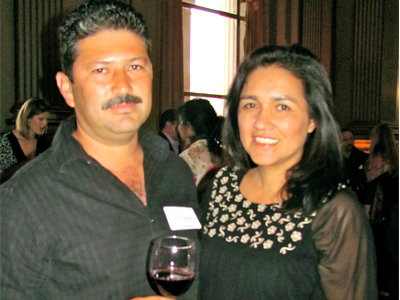
It’s been forty years since a handful of volunteer physicians began operating a part-time clinic out of a small room above La Luna Market in the Napa Valley town of Rutherford. It was 1972 and with no county hospital or county-provided primary care, low-income, uninsured farmworkers had nowhere to go for affordable health services. Today, Clinic Ole is a comprehensive Federally Qualified Health Center with 25,000 patients, 180 employees, and eight locations throughout Napa Valley.
On June 21st, ten Latino wine makers poured their wines in The War Memorial Green Room in San Francisco for Viña — a benefit for the clinic’s farmworker outreach program, organized by the Economic Empowerment Fund. The outreach program operates on a $40,000 annual budget and enables the organization to conduct health fairs at vineyards and farmworker housing. Richard Ventura, president and CEO of the Economic Empowerment Fund, said that his mission is to double that budget every year.
“That small budget enables this amazing organization to do things like diabetes prevention and care, cholesterol management, even bringing in the CHP [California Highway Patrol] to show how to properly secure car seats,” he said. “They teach all these little health tips that add up and collectively make a huge impact.”
Half of the Clinic’s patients are farmworkers and their families, and many of them suffer from diabetes, muscular issues, hypertension, dizzying and other conditions developed on the job. In addition to primary and preventative care, the clinic offers a range of bilingual services from pre-natal case management and obstetrics and gynecology services, to dental services at a sister clinic.
“Tonight goes full circle: to make a good product, the people helping to make it need to be healthy. As a business, without our employees we would be nothing,” said Everardo Robledo, CFO of Robledo Family Winery.
Everardo’s father, Reynaldo Robledo, came to the U.S. as a migrant farmworker, and built the family winery and vineyard management company after working his way through the industry. “When I was a kid we used to go to a clinic, which really helped my parents out because we were such a big family. Now, some of our workers use the clinic or have in the past. It means a lot to us that there’s an institution that cares about the industry’s workers.”
Robledo explained that most of the Latino vintners in the room aren’t far removed from cultivating the grape fields, and recognize farmwork as the backbone of the industry. “Most of us have started from the ground up, and put in our time in the fields. We’ve done it all,” he said. Take Rolando Herrera, owner of Mi Sueño Winery. Herrera came from the Mexican state of Michoacán, and began his life in the wine industry as a dishwasher. Herrera moved up the ranks from line cook to laborer to cellar’s master, and pursued several winemaking gigs throughout the valley before he began a side project of 200 cases of chardonnay. “Now we make 10,000 cases, and have had three wines poured at the White House,” said Tom Bracamontes, Director of Sales and Marketing.
Mi Sueño Winery and Robledo Family Winery are two of the 13 wineries that make up a new alliance called the Napa Valley Mexican-American Vintners Association (NVMAVA), a non-profit with a mission to promote Napa and Sonoma County wines produced by Mexican-American vintners, and to promote and support the contributions of Mexican-Americans to the wine industry. The association will be hosting its second annual event, a food and wine celebration, on August 18th. Hugo Maldonado, winemaker and owner of Maldonado Vineyards, said that the association is also about nurturing a younger generation of Mexican-Americans in the Valley to pursue careers as growers, winemakers, and executives. “We want to serve as a resource for young people in the industry,” he said. “We want to let the younger generation know that there’s something beyond working in the fields. That they can do more— if we can do it, they can do it.”
